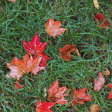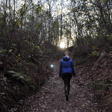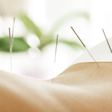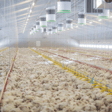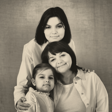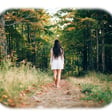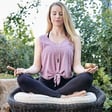Become a Creator today!Start creating today - Share your story with the world!
Start for free
00:00:00
00:00:01

Full Spectrum Holistic Health - The Benefits of Darkness
So often, people are afraid of the dark, or cannot see the positive side of darkness. In this episode, I want to talk about how darkness benefits us... and not just humans, but everything that is alive on Earth.
Transcript
Introduction to Holistic Health Podcast
00:00:00
Speaker
Hello and welcome to the full spectrum holistic health podcast. Now this podcast is all about holistic health, what it is, various holistic and alternative health therapies, and how those may help you to be a healthier person. Thanks for choosing to listen today, because I know that there are many podcasts out there for you to choose from, but I'm glad you're here. I'm the host for the podcast, Dr. Anthony Burton.
00:00:28
Speaker
I'm a Reiki master, EFT therapist, meditation teacher, shamanic practitioner, and sound therapist. My goal is to help people be healthier in mind, body, and spirit. And that's why I'm here. A large part of what I do is really educational in nature because so many people are unaware of the power and efficacy of various holistic and alternative therapies.
00:00:54
Speaker
In these podcasts, you'll hear stuff that I hope will inform you, enlighten you, and energize and balance you. And of course, it's not only going to be my opinions and ideas, because occasionally I will be interviewing knowledgeable and interesting guests from a variety of areas of holistic, complementary, and even allopathic medical practice.
00:01:14
Speaker
So kick back and relax, open your mind and listen.
Importance of Darkness and Circadian Rhythms
00:01:19
Speaker
Spectrum Holistic is a complimentary health and wellness business located in Northwest Georgia, USA. Check out the website at www.spectrum-holistic.com. You know, so often we hear people speak of darkness in a negative way, like
00:01:41
Speaker
You need to come out of the darkness. Or, gosh, you're acting really dark. Or, boy, that movie is really dark. But you know, if the creator had not seen that we need darkness just as much as we need light, the sun would shine on us 24 hours a day, 365 days a year. Our bodies, our minds, in fact, all of living nature needs some darkness.
00:02:11
Speaker
Even our world's total ecosystem, without darkness, could not exist for long. Humans, and really all living things, have what are called circadian rhythms. What are circadian rhythms? Well, circadian rhythms are physical, and mental, and behavioral changes that follow a 24-hour cycle.
00:02:36
Speaker
Humans, dogs, fish, lizards, even microbes all have circadian rhythms and even plants. Now think about it. If you've ever had a pet rat or a mouse or a hamster, you probably remember the annoying way they would get on their little exercise wheels in the middle of the night and make it squeak, squeak, squeak, squeak. That's because those animals are primarily nocturnal animals.
00:03:05
Speaker
Now, most birds, on the other hand, are diurnal. And that means that they are most active in the daytime and they rest or sleep at night. Chickens and guinea fowl and turkeys go to their roosts at night. You know, I'm a country guy, so I know about these kind of things.
00:03:24
Speaker
If you were living in a rural area, you know, if you're outside and just as the sun's coming up, you will start to hear the birds beginning to stir and sing as they start their day. Now, some other animals can adapt to their environment or their owners actions and behaviors.
00:03:45
Speaker
Have you ever had a pet ferret? I've had two or three of them. And they're a lot of fun to watch and play with. As long as you keep your valuables, your shiny objects put away. They love to steal and hide keys and jewelry. Trust me, I've had to search for my car keys more than once. Wild ferrets, which are like weasels or related to weasels, are mostly nocturnal. But ferrets are actually what are called crepuscular.
00:04:13
Speaker
which means they adapt to their environment or how their owners get them out and play with them. And if their owners get them out mostly during the daylight hours, well, they adapt to that. They'll become daylight critters. So human beings, since they are for the most part diurnal, they function at their best in the daytime, usually, rather than at night. And conversely, they sleep best at night.
00:04:36
Speaker
Of course, there are exceptions and variations. There are people who love to rise at the crack of dawn and go to bed early. Or there are people who seem to be most productive at 2 a.m. But either way, we all have circadian rhythms that definitely influence how well we function during the 24 hours that we call one solar day.
00:04:59
Speaker
And we all require sleep. And of course, there is always a lot of discussion about how much sleep individuals need based on their age, their gender, and so forth. I mean, there are always articles coming out about how teenagers need more sleep than adults, you know, and maybe that older people, much older people in their 70s and 80s, they may or may not require as much sleep, but people don't like to be told how much sleep they need.
00:05:25
Speaker
especially with so many things that seem to demand our attention. Americans, well, everybody, I guess, really, are very, very busy all the time.
Role of Sleep and Melatonin in Health
00:05:36
Speaker
But the American Academy of Sleep Medicine and the Sleep Research Society recommend that adults between the ages of 18 and 60, I mean, that's a big spread, but it's adults, get at least seven hours each night to promote optimal health and well-being.
00:05:54
Speaker
Now that means good sleep. I don't mean tossing and turning, waking up and watching TV for 30 minutes and then trying to go back to sleep or maybe getting up and checking your social media accounts. Solid, continual sleep. Well, you know, of course you got to make time for a reasonable number of bathroom trips probably. But how do you get good sleep? Well, there are a lot of things that contribute to a good night's sleep.
00:06:19
Speaker
But for this particular episode of the podcast, I want to focus on one thing, one particular aspect of your sleep environment, and that is darkness or lack of it. A lot of people like to go to sleep with the TV on in their bedroom. My late father, he would do that quite often because he was a widower and he, you know, he just was lonely sometimes. So he would turn the TV on just to have something going on. He would go to sleep with that TV going.
00:06:51
Speaker
Now, other people like to have a brightly shining LED clock or a couple of night lights in the bedroom. And then there are people who sleep with their bathroom light on, shining into the bedroom to avoid stubbed toes on furniture. We all know that the primary reason for the existence of a little toe is to locate furniture in the dark, right? And of course, there's a lot of light pollution from advertising signs and street lights and security lights.
00:07:18
Speaker
especially if you are in an urban or suburban environment. Your neighbor might have a security light that shines in your bedroom window, or you might have signs that are across the road from you that are brightly lit. Thing is, none of that is good for you because the best, healthiest sleep you can get is in total darkness. It may require a little adaptation on your part, you know, to get used to that idea without having
00:07:45
Speaker
night light or something but it really is the best thing for you. Scientists know that sleeping in total darkness is vastly healthier than in a semi-lighted room. They have discovered that sleeping in a totally dark room allows the body to produce melatonin and melatonin fights disease including cancers such as breast cancer and prostate cancer. The bad thing
00:08:13
Speaker
According to photobiologists, that's someone who studies the effects of light on our biology and how it functions. Joan Roberts, PhD, she says that even having a little bit of light around you while you are sleeping will decrease or even totally stop melatonin production. While I'm on the subject of melatonin, let me reemphasize something that I have said before. Melatonin is not an herb.
00:08:41
Speaker
Nor is it a sleeping pill, nor a sedative. It's a hormone, as I just said. And it's produced naturally by the body when you are sleeping in a dark room. It's not a sleep inducer. Rather, it is a sleep regulator. And although you can buy melatonin at just about any grocery store, drug store, health food store, that melatonin in that bottle probably produced in a laboratory instead of naturally by the human body.
00:09:10
Speaker
I can almost guarantee it. So sleeping with a light on or the TV on or anything else that keeps the room from being really, really dark will inhibit your body's ability to produce melatonin. And that screws up your sleep patterns because you've just taken the regulator away. And this sort of thing often happens when people have to work rotating shifts. I've had to do it before and gosh, it was hard, especially in the military had to do it quite often.
00:09:40
Speaker
because they are trying to sleep at times when their body is not producing the right amount of melatonin. Or sometimes it's a problem for those on long flights to keep them from sleeping at their normal times. Jet lag and recovering from jet lag can be pretty annoying. Here is something really important. A study presented to the American Association for Cancer Research found that melatonin and slow tumor growth by up to 70%
00:10:10
Speaker
and mice infected with human breast cancer cells. But when the mice were subjected to constant light inhibiting their natural melatonin production, the growth of cancer cells shot through the roof. As I said before, although you can buy melatonin from the store as a food supplement, your body's own naturally produced melatonin is better for you and it's free. It doesn't cost you anything. And add to that,
00:10:38
Speaker
It's a problem of your body developing tolerance to melatonin because we people in general say, oh, you know, 50 milligrams of melatonin is good. Must be great to take a hundred milligrams of melatonin or 200 grams of melatonin. Wow. That'll really make me sleep. No, that's not it because the more of it you take, it means that you require more and more of it over time to achieve the same results and
00:11:04
Speaker
If you are living in a city like an urban or suburban environment where you have light pollution, it even weakens the immune systems of animals who live around those cities. They cannot find places that are totally dark to sleep, you know, burrows or dens or something. Having lots of bright lights around your house all night can throw off the circadian rhythms of birds and other animals who live near you. Now, our internal clocks,
00:11:33
Speaker
that are built into us that regulate how our bodies function and when they do what they're supposed to do was originally created to function based on natural circadian rhythms. The eons, since humanity appeared on the scene, have continued building on that. It's an established pattern in our bodies. Our bodies are not built mentally, physically, or biochemically to function as 24-hour machines. Now sure, you know, you can do it
00:12:03
Speaker
On the short term, you might be able to survive it for the short term, but over a long haul, you are really working to the detriment of your own personal health, both physically, mentally, and emotionally. Sure. We often force ourselves to work during the times when most of those around us are asleep. And then we make our way home like zombies and fall into bed and unsatisfying sleep.
00:12:30
Speaker
that is taking its toll on all those who take the path of, I've got to work long hours to make it in this world. Scientific research suggests that even though a person may have worked years of night shifts, many of their internal clocks never adjusted to a forced schedule and requires them to fight the biology that is built into their brains and bodies.
Challenges of Night Shift Work
00:12:55
Speaker
In other words, no matter how long we've been doing it, we're still hurting ourselves and we don't realize it. The result? More scientific studies illustrate that people who work the night shift have increased risk of a variety of health issues. Constipation. I know that sounds little, but tell you what, you've had that for a couple of weeks in this game. You're not going to like it. Stomach ulcers, stress, depression,
00:13:24
Speaker
heart disease, cancer, and more. Humans simply do not have the same adaptive corpuscular abilities that ferrets and some other animals have. And some of those animals are like deer and bear and skunks and foxes, for example.
00:13:44
Speaker
However, the presence or absence of light does not affect only animals and humans. Trees, flowers, and food crops, with a few exceptions, all need a certain amount of darkness to thrive. I got some information from a website called The Practical Planter at www.thepracticalplanterallwinword.com. And here's what he said.
00:14:13
Speaker
Plants are definitely not dormant when it's dark. In fact, this is often the time when they do more growing because they have an entire day's worth of energy stored up and ready to metabolize. Plants do need that period of darkness for their metabolism to work properly. They are not designed to create food non-stop and it will do them harm in the long run and put them in this sort of situation. So yes,
00:14:41
Speaker
Plants need their darkness just as much as they need their light. We modern Westernized humans tend to stay up later and stay awake longer than our forebears. You know, in pioneer times, it was, you know, you go to bed when it gets dark because making light, enough light to see by and to do things was really difficult and could be expensive. Candles were not cheap. So when it got really dark,
00:15:10
Speaker
you went to bed and then you got up when it got light. We have almost become addicted to staying up late and Jennifer Piercy, one of my favorite meditation and yoga nidra experts says, quote, we are surrounded by junk light. I love that expression, junk light. Junk light is light that serves no good, healthy, useful purpose and keeps us from getting the restful darkness that we all need.
Creating a Restful Sleep Environment
00:15:39
Speaker
What is yoga nidra, you may ask? Yoga nidra is a specific yogic practice which translates to yogic sleep. It doesn't really involve any special postures except for lying down and relaxing. Rather, it's really more like a form of meditation that is specifically intended to relax the entire body, inducing a very relaxed state that can facilitate and improve sleep.
00:16:08
Speaker
here's some advice from me to you. Turn off that little night light in your bedroom or unplug it or the one that shines in from the bathroom. If you need light when you get up in the night, get one of those motion sensor night lights. The set of the ones that are on all the time. So that way when you do get up, you start to walk in the room until the light comes on. You don't stub your toes. You go in the bathroom, you come back and it turns itself off.
00:16:35
Speaker
Get some dance curtains that will keep ambient light out of your bedroom. Not little thin, gauzy, filmy things that will let in a lot of light, even from a brightly shining moon. I mean, I've had my bedroom illuminated by bright moonlight before, so much that I could read a book. Don't, I mean, don't go to sleep with the television, the computer, the tablet, or the phone glowing in your room. Make your sleeping quarters, whatever they may be,
00:17:05
Speaker
into a dark, snug, comfortable place. Sink into that solid sleep and let your body produce all the natural melatonin that it needs. You'll give your immune system a boost and strengthen your body's resistance to cancer and other diseases. Your better sleep hours will have a positive impact on your mood too, and you'll deal better with the stresses associated with relationships, with work, and dare I say it,
00:17:35
Speaker
a dreaded commute, if you have one. You know, Paul Simon had it right with the lyrics. Hello darkness, my old friend. I've come to talk with you again. Darkness can be our friend, aiding us to be our physical, mental and emotional best by giving us an environment to reboot and allow ourselves a chance to replenish and strengthen themselves.
Growth Through Personal Challenges
00:18:07
Speaker
And since this is a holistic health practice, and I don't talk just about the physical, let me touch on another aspect of the word darkness, our spiritual, mental, or emotional darkness. And while many people would deny the good that comes from those forms of darkness, I'd differ with them. Have you ever known anybody who had a constantly cheerful outlook
00:18:34
Speaker
who never seem to have a bad day, they get up perky and they smile all the time. I don't trust people like that, to be honest. Everyone has something negative going on in their life at one time or another. They simply may not wish to admit those times. The thing is, we need those times of personal darkness. Why? Well, think about it this way. If you went to the gym,
00:19:04
Speaker
and never lifted more than 10 pounds, 20 reps each trip. You know, 20 reps on one arm, 20 reps on the other, 10 pounds each time. How much benefit do you really think you would gain from that? Or how about if you were studying a foreign language and all you ever had to learn were the first grade words. How much do you think you really would learn about that language? If you wanted to be a math major,
00:19:33
Speaker
But all the problems you ever solved were addition, subtraction, multiplication, or division. How could you understand differential equations when you were faced with them? We need challenges. We need to have to push ourselves at times, whether it's to get a better time for those two miles on the treadmill, or to spell words with more than two syllables, or paint something other than paint by number pictures.
00:20:02
Speaker
Personal darkness challenges us. It pushes us to reach within for resources we may not even know we have. Sometimes it calls upon us to reach out to others for help, and this strengthens healthy relationships, so that's not a bad thing. If we are religious, times of darkness can urge us to call upon a power greater than ourselves, building our faith and trust in whatever deity or power we may call upon.
00:20:32
Speaker
Now, while it's great to be in the light, sometimes we need some darkness to show us that we can move beyond what is easy. We need to learn that we can survive and maybe even thrive when things are not going our way.
Conclusion and Listener Engagement
00:20:53
Speaker
I want to thank you for being here and listening to the podcast today. I hope it's been interesting and informative and thought provoking.
00:21:01
Speaker
If you did find it interesting, please be sure to return for another episode and tell your friends about it too. I appreciate if you do that because it really helps me out. You can share directly from most podcast platforms and subscribing to the podcast would be great. If you want to tell me you like the show.
00:21:22
Speaker
or that you hated it, that you agree or disagree with me or anything else, really, go for it. Just leave a message for me on your podcast platform. Until next time, stay safe, stay healthy, and keep an open mind. Namaste.
